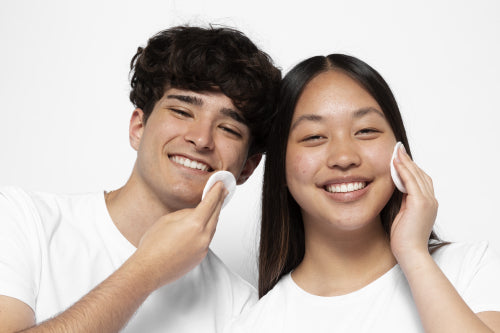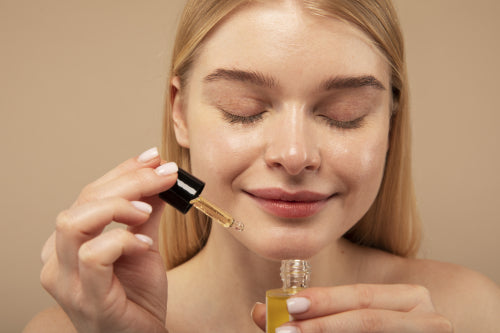Top 5 Myths About Skincare Debunked

Skincare is an ever-evolving field with new trends, products, and advice constantly emerging. Amidst the sea of information, its easy to get lost in a maze of skincare myths that can do more harm than good. As a result, many people unknowingly follow inaccurate or misleading advice, leading to ineffective or even damaging skincare practices. In this blog, were going to debunk the top five common skincare myths that can hinder your quest for healthy, glowing skin.
Myth #1: "Oily Skin Doesnt Need Moisturizer"
Many people with oily skin believe that moisturizing will exacerbate their skin's oil production. This myth can lead to an overly dried-out skin barrier, which ironically increases oil production as the skin tries to compensate for the lack of hydration. The truth is, oily skin still requires moisturejust the right type.
Oily skin produces excess sebum, but it doesnt necessarily mean its well-hydrated. Dehydration can cause the skin to overcompensate by producing more oil. When choosing a moisturizer for oily skin, look for oil-free or gel-based formulas that hydrate the skin without clogging pores or making it greasy. Hydration is key to balancing your skin's natural oil production.
Myth #2: "You Only Need Sunscreen on Sunny Days"
One of the most dangerous skincare myths is the belief that sunscreen is only necessary when the sun is shining. This myth is not only misleading but can also put your skin at significant risk. Ultraviolet (UV) rays can penetrate clouds and still reach your skin, causing long-term damage even when it's overcast.
UV radiation is present all year round, regardless of the weather. In fact, up to 80% of UV rays can still reach the skin on cloudy or rainy days. Furthermore, UV rays can penetrate through windows in your home, car, or office. Whether youre indoors or outside, applying sunscreen dailyideally with a broad-spectrum SPF of 30 or higheris essential for protecting your skin from premature aging, sunburn, and skin cancer.
To ensure your skin is protected throughout the day, make sunscreen application a habit in your morning skincare routine. Dont forget to reapply every two hours when outdoors or if youre sweating or swimming.
Myth #3: "Natural Products Are Always Better for Your Skin"
The rise in the popularity of "natural" and "organic" skincare products has led to the myth that natural ingredients are always better and safer than synthetic ones. While its true that some natural ingredients offer great benefits, not all of them are suitable for every skin type, and some can even cause irritation or allergic reactions.
For example, essential oils like lavender or eucalyptus, though often praised for their natural properties, can be too harsh for sensitive skin, causing redness, burning, or allergic reactions. Additionally, some natural ingredients may not be as effective in preserving the products shelf life or maintaining its stability, which can lead to bacterial contamination or diminished effectiveness over time.
On the other hand, synthetic ingredients are rigorously tested and often formulated to address specific skin concerns. Ingredients like hyaluronic acid, peptides, and retinoids are widely considered to be highly effective for various skin types, and theyre often synthetically derived for consistency and reliability.
The key takeaway here is that the effectiveness and safety of a product depend on its ingredients and how they interact with your skinnot whether they are natural or synthetic. Always patch test new products and consult with a dermatologist to find out whats best for your individual skin needs.
Myth #4: "Expensive Products Are Always More Effective"
Another common misconception is that the more expensive the product, the more effective it must be. While its true that some high-end skincare products can deliver great results due to their carefully chosen ingredients or cutting-edge technology, this doesnt mean that more affordable products can't be just as effective. The price tag doesnt always correlate with the performance of the product.
Many affordable skincare products contain proven active ingredients like vitamin C, retinol, or niacinamide, which are known to improve skin texture, brighten the complexion, and reduce signs of aging. In fact, many budget-friendly options perform just as well as luxury brands, especially when it comes to basic skincare needs like hydration, cleansing, and sun protection.
Instead of focusing on price, focus on the ingredients and their concentration. Always look for products that address your specific skin concernswhether its acne, wrinkles, or drynessand choose formulations with proven, effective ingredients. You can achieve healthy skin without breaking the bank.
Myth #5: "Pimples Are Caused by Dirty Skin"
Its easy to blame pimples on dirt and bacteria, but the real cause of acne is far more complex. While bacteria can play a role in acne breakouts, pimples are primarily caused by clogged pores, excess oil production, and inflammationoften triggered by hormonal fluctuations, stress, diet, or genetic factors. Clean skin is certainly important, but over-washing or scrubbing your face can strip the skins protective barrier, leading to dryness, irritation, and even more breakouts.
Many acne treatments focus on harsh, drying products that strip away the oil in an attempt to eliminate pimples. However, overuse of these products can lead to a damaged skin barrier, which exacerbates acne by encouraging the skin to produce even more oil. Instead, use gentle, non-comedogenic cleansers that effectively cleanse the skin without disturbing its natural balance.
Additionally, treatments that target acne typically include ingredients like salicylic acid, benzoyl peroxide, and retinoids, which help clear clogged pores, reduce inflammation, and prevent future breakouts. Its essential to remember that pimples are not a sign of poor hygiene, and achieving clear skin requires a balanced skincare routine tailored to your skins needs.
More Radiant Skin
Debunking these common skincare myths is essential for creating an effective skincare routine that works for you. Skincare is not one-size-fits-all, and each persons skin has unique needs. By relying on evidence-based information and focusing on proven ingredients rather than myths or trends, you can achieve healthier, more radiant skin.
Remember, healthy skin is the result of consistent care, proper hydration, sun protection, and addressing specific skin concerns with the right ingredients. Whether you're dealing with oily skin, acne, or the signs of aging, a thoughtful skincare routine tailored to your needs will give you the best results.
If you're unsure about what products are right for your skin, dont hesitate to consult with a dermatologist. They can help you navigate the confusing world of skincare and provide personalized advice that addresses your concerns. And, as always, make sure to enjoy the process of taking care of your skinbecause healthy, glowing skin comes from within and from consistent, informed choices.
You may also be interested in: Stellar Daily Serum Desavery
Tired of putting harsh chemicals and synthetic ingredients in your skin? Discover the gentle, plant-powered, and cruelty-free skincare routine from Desavery. Meticulously crafted for every skin type, our day-and-night formulas nourish and revitalize, giving your skin a healthy, radiant glow. Join the community of those whove found a natural, effective solution for their skincare needs. Let your glowy skin tell a story of health and natural beauty. Shop Desavery Now!
Powered by flareAI



